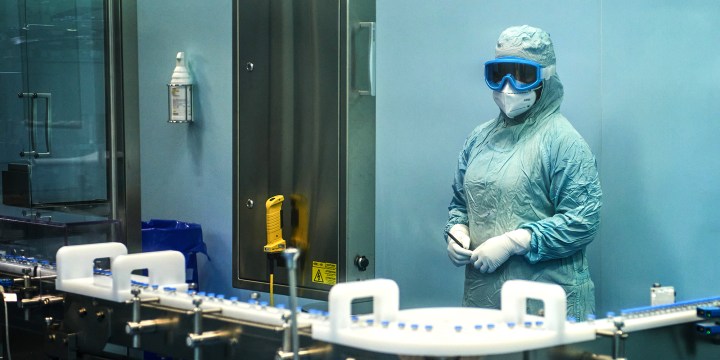CORONAVIRUS
Expert sounds alarm on fifth wave after Covid-19 curve turns upwards in SA

Early indications, including a rise in test positivity rates and the presence of the SARS-CoV-2 virus in the country’s wastewater, are sounding the alarms for the arrival of a possible fifth, winter wave in South Africa.
It is not clear yet whether the currently dominating Omicron variant BA2 is being replaced by a different subvariant, the head of the National Institute for Communicable Diseases (NICD), Professor Adrian Puren, said on Thursday.
Two subvariants, BA.4 and BA.5, are being tracked by the World Health Organization, as more cases of these have been found in countries other than South Africa.
Looking at the case numbers, it appears they are increasing rapidly, with a rise in the number of positive tests in the country.
“The public should exercise caution in interpreting these data as there may be changes in test patterns. An early warning indicator, wastewater detection surveillance, shows an increase in Gauteng,” Puren said, adding that there was no clear evidence that Omicron was being displaced as the significant circulating variant.
On Thursday, the NICD reported that 10.6% of Covid-19 tests were positive in the past seven days, which was 2.6% higher than the previous week.
Testing across the country is, however, lower than the previous week. Gauteng has the highest number of people testing and Limpopo the lowest.
But despite relatively low testing numbers, the percentage of positive tests increased in all provinces except North West, Mpumalanga and Limpopo, where it was unchanged.
The Western Cape had the highest percentage of positive tests (14.4%), followed by Gauteng (11.7%) and KwaZulu-Natal (10.8%).
Young teenagers accounted for the highest number of positive tests.
Gauteng is again showing a marked increase in Covid-19 cases, reporting the highest weekly incidence risk (27.4 cases per 100,000 people), followed by the Western Cape (23.4 per 100,000), and KwaZulu-Natal (13.4 per 100,000).
The country’s early Covid-19 outbreak alarm system, the wastewater monitors, also reported a marked increase in cases, with scientists isolating the BA.4 variant in Gauteng’s wastewater.
According to the latest report, published on Thursday, wastewater levels of coronavirus are rising in Gauteng, KwaZulu-Natal, the Free State and the Western Cape. In Gauteng, ongoing increases have been observed at Rooiwal and Sandspruit (Tshwane North), Vlakplaats (Ekurhuleni South) and JP Marais (Ekurhuleni North), while stable higher levels have been recorded at Daspoort (Tshwane South), Hartebeesfontein (Ekurhuleni North) and Goudkoppies (Johannesburg South). There have been sustained increases in eThekwini (Northern and Central) and in the City of Cape Town (Borcherds Quarry and Zandvliet).
Analysis found that most samples contained Omicron’s BA.4 subvariant.
Internationally scientists are studying whether BA.4 and BA.5 have mutated to increase the virus’ ability to evade previously acquired immunity.
At this stage it is not clear whether BA.4 or BA.5 will cause more severe disease. Sequencing data from two weeks ago (up to 14 April) showed that these Omicron sublineages increased in prevalence in March (15%), and appeared to be dominant in April, although additional sequencing data are needed for this period. A new report for the week of 21 April has not been published yet.
Dr Waasila Jassat from the NICD said there is evidence of small increases in Covid-19 hospital admissions in Gauteng, the Free State and KwaZulu-Natal, but not in Covid-19-related hospital deaths.
Researchers added in their report that they had also found the Delta variant in Johannesburg’s wastewater but the “significance of these remains unclear”.
Health Department spokesperson Foster Mohale said the department has noted the increase in cases with concern.
“Our experts and the NICD are closely monitoring the situation. This is probably driven by subvariants of Omicron. We remind and urge unvaccinated and partly vaccinated people to vaccinate and get booster shots in order to protect themselves,” he said.
Mohale said it was too early to tell if this is the beginning of the anticipated fifth wave.
However, coronavirus might not be the only reason people are falling ill, since there has been an increase in flu cases as well.
“Respiratory syncytial virus (RSV) season is ongoing and we have noticed sporadic cases of influenza. Influenza vaccination is therefore strongly encouraged for all high-risk groups like healthcare workers in the workplace, people aged 65 and older, women who are pregnant and individuals with comorbidities such as heart disease, high blood pressure, chronic respiratory diseases, cancer and diabetes,” said Dr Sibongile Walaza, medical epidemiologist at the NICD’s Centre for Respiratory Diseases and Meningitis.
In its weekly update on the pandemic, the World Health Organization said new cases and deaths have continued to decline since the end of March 2022.
Between 11 and 17 April, more than five million cases and more than 18,000 deaths were reported globally – a decrease of 24% and 12%, respectively – compared with the previous week.
In his weekly newsletter, epidemiologist Professor Salim Abdool Karim said there have only been three truly global variants during the pandemic: Beta, Delta and Omicron.
“If the next variant is going to displace Omicron, it will likely become the fourth global variant. In anticipating the next variant… In case you heard someone say that new variants are unlikely because of widespread vaccination, think again,” Abdool Karim said, quoting the latest research published in the Journal of Infectious Diseases showing that vaccinations are not generating protective immunity in a high proportion of immunocompromised people.
“They are at risk of getting infected and if they do get infected with persistent infection, there is a good chance that the virus will be exposed to low levels of vaccine-induced antibodies, driving immune escape. And this is the group we are most concerned about – because immunocompromised individuals may be a source of new variants,” he added.
According to the latest statistics from the Department of Health, just under half of adults (49.14%) have been fully vaccinated against Covid-19. DM/MC
This story first appeared in our weekly Daily Maverick 168 newspaper which is available for R25 at Pick n Pay, Exclusive Books and airport bookstores. For your nearest stockist, please click here.
"Information pertaining to Covid-19, vaccines, how to control the spread of the virus and potential treatments is ever-changing. Under the South African Disaster Management Act Regulation 11(5)(c) it is prohibited to publish information through any medium with the intention to deceive people on government measures to address COVID-19. We are therefore disabling the comment section on this article in order to protect both the commenting member and ourselves from potential liability. Should you have additional information that you think we should know, please email [email protected]"






 Become an Insider
Become an Insider